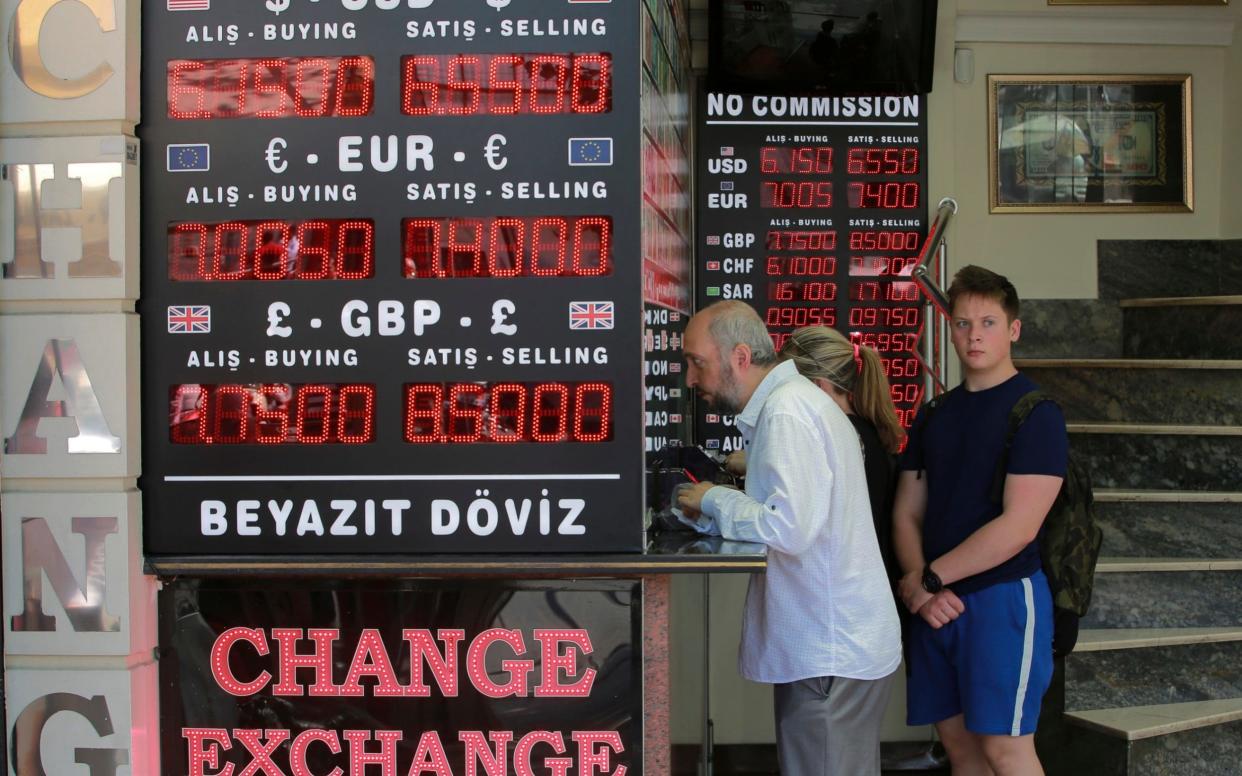Turkey escalates trade dispute with US by raising tariffs as Asian markets sag

Turkey is increasing tariffs on imports of a range of US products, escalating a diplomatic and trade dispute that has roiled global markets and helped trigger a currency crisis.
Extra tariffs were being imposed on imports of products, including rice, vehicles, alcohol, coal and cosmetics, according to an announcement on the Official Gazette.
Fuat Oktay, Turkey's Vice President, said on Twitter that the tariffs on certain products were increased "within the framework of the principle of reciprocity in retaliation for the conscious economic attacks by the United States".
The announcement came as Asian shares fell in morning trade on Wednesday, with concerns about Turkey's financial crisis weighing on investor sentiment.
Hong Kong was down 1.5 percent, Shanghai was off 1.3 percent, Tokyo slipped 0.3 percent and Sydney fell 0.5 percent. Seoul was closed for a holiday.
Spreadbetters expected European stocks to open slightly higher, with the FTSE seen rising 0.2 percent, Germany's DAX adding 0.1 percent and France's CAC gaining 0.15 percent.
Turkey nears point of no return as lira crisis spreads to the banking system
However, the crisis-hit lira took a breather following the turmoil of the past week.
Wall Street and the Turkish currency clawed back ground overnight after a rout that started on Friday and saw the unit plunge to record lows.
The lira was steady at 6.53 to the dollar and 7.43 to the euro in Asian morning trade, well off the record lows of 7.24 to the dollar and 8.12 to the euro seen Monday. It is still sharply down from Friday.
"The pressure has been relieved, but not released, on the Turkish lira as traders tire of selling after the currency seems to have found a base," Greg McKenna, chief market strategist at AxiTrader, told AFP.
The dollar, meanwhile, hit another 13-month high against a basket of major currencies on Wednesday as safe-haven demand boosted the US currency.
The greenback's strength - overnight it also hit a 13-month high - has been bolstered by a fall for the euro, dogged by concerns over exposure of European banks to Turkey.
Top 10 | Where is the pound going further?
"In light of all the turmoil we've seen out of Turkey and the subsequent contagion into other emerging markets, the dollar is pretty much establishing itself as the safe-haven currency," said Bart Wakabayashi, Tokyo branch manager at State Street Bank.
"The dollar is the higher-yielding of the safe-haven currencies, so it obviously will attract the most flows. If you are going to park your money somewhere to stay away from the turmoil, the dollar is going to be the currency of choice," he said.
The pound hit a 13-month low, dropping 0.2 percent to $1.2694 on the back of weaker-than-forecast wage growth figures released on Tuesday.
"With the Bank of England unlikely to raise rates for some time (the market prices the next hike for 12 months' time), UK economic data will be a second-order consideration for the pound compared to Brexit negotiations for now," Nick Smyth, an interest rate strategist at BNZ Markets in Wellington, said in a note.
While market pressures have eased for now, analysts believe the diplomatic row is far from over and could still rattle markets.
Andrew Brunson: The evangelical US pastor at the heart of the Turkey crisis
Investors are worried not only about Turkey's souring relations with the US, a longtime Nato ally, but also Turkish President Recep Tayyip Erdogan's economic policies and the country's high debt accumulated in foreign currencies.
Turkey has accused the United States of waging an "economic war" as part of a plot to harm the country.
Washington has imposed financial sanctions on two Turkish ministers and doubled steel and aluminum tariffs on Turkey, as US President Donald Trump tries to secure the release Andrew Brunson, an American pastor being tried in Turkey on espionage and terrorism-related charges.
Even before the latest tariffs move, Mr Erdogan was showing no sign of backing down, saying on Tuesday that Turkey would boycott US electronic goods.

